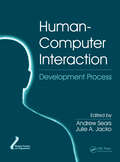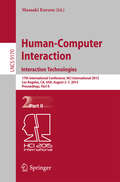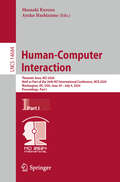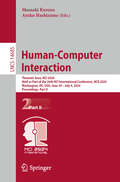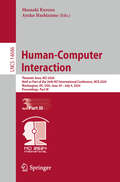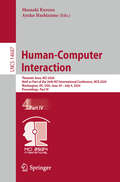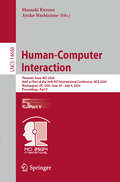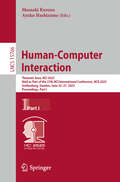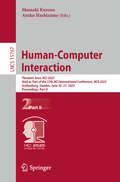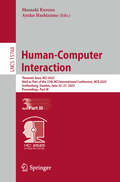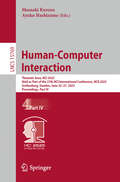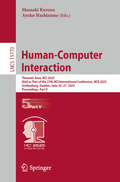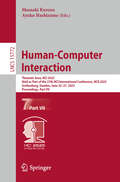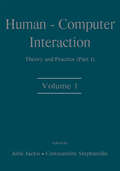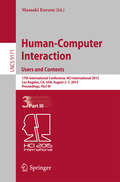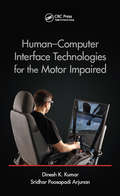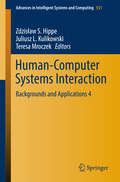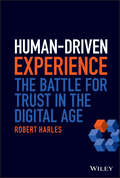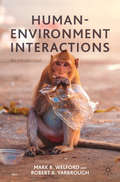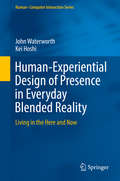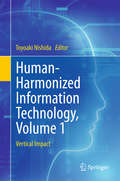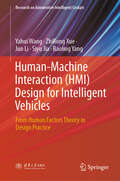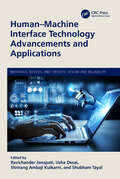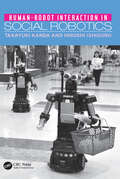- Table View
- List View
Human-Computer Interaction: Development Process (Human Factors and Ergonomics)
by Julie A. Jacko Andrew SearsHailed on first publication as a compendium of foundational principles and cutting-edge research, The Human-Computer Interaction Handbook has become the gold standard reference in this field. Derived from select chapters of this groundbreaking resource, Human-Computer Interaction: The Development Practice addresses requirements specification, desig
Human-Computer Interaction: Interaction Technologies
by Masaaki KurosuThe 3-volume set LNCS 9169, 9170, 9171 constitutes the refereed proceedings of the 17th International Conference on Human-Computer Interaction, HCII 2015, held in Los Angeles, CA, USA, in August 2015. The total of 1462 papers and 246 posters presented at the HCII 2015 conferences was carefully reviewed and selected from 4843 submissions. These papers address the latest research and development efforts and highlight the human aspects of design and use of computing systems. The papers in LNCS 9170 are organized in topical sections on gesture and eye-gaze based interaction; touch-based and haptic interaction; natural user interfaces; adaptive and personalized interfaces; distributed, migratory and multi-screen user interfaces; games and gamification; HCI in smart and intelligent environments.
Human-Computer Interaction: Thematic Area, HCI 2024, Held as Part of the 26th HCI International Conference, HCII 2024, Washington, DC, USA, June 29 – July 4, 2024, Proceedings, Part I (Lecture Notes in Computer Science #14684)
by Masaaki Kurosu Ayako HashizumeThis five-volume set LNCS 14684-14688 constitutes the refereed proceedings of the Human Computer Interaction thematic area of the 26 International Conference on Human-Computer Interaction, HCII 2024, held in Washington, DC, USA, during June 29 – July 4, 2024. The total of 1271 papers and 309 posters included in the HCII 2024 proceedings was carefully reviewed and selected from 5108 submissions. The VAMR 2024 proceedings were organized in the following topical sections: Part I: HCI Theory and Design and Evaluation Methods and Tools; Emotions in HCI. Part II: Human-Robot Interaction; Child-Computer Interaction. Part III: HCI for Mental Health and Psychological Wellbeing; HCI in Healthcare. Part IV: HCI, Environment and Sustainability; Design and User Experience Evaluation Case Studies. Part V: Multimodality and Natural User Interfaces; HCI, AI, Creativity, Art and Culture.
Human-Computer Interaction: Thematic Area, HCI 2024, Held as Part of the 26th HCI International Conference, HCII 2024, Washington, DC, USA, June 29 – July 4, 2024, Proceedings, Part II (Lecture Notes in Computer Science #14685)
by Masaaki Kurosu Ayako HashizumeThis five-volume set LNCS 14684-14688 constitutes the refereed proceedings of the Human Computer Interaction thematic area of the 26 International Conference on Human-Computer Interaction, HCII 2024, held in Washington, DC, USA, during June 29 – July 4, 2024. The total of 1271 papers and 309 posters included in the HCII 2024 proceedings was carefully reviewed and selected from 5108 submissions. The VAMR 2024 proceedings were organized in the following topical sections: Part I: HCI Theory and Design and Evaluation Methods and Tools; Emotions in HCI. Part II: Human-Robot Interaction; Child-Computer Interaction. Part III: HCI for Mental Health and Psychological Wellbeing; HCI in Healthcare. Part IV: HCI, Environment and Sustainability; Design and User Experience Evaluation Case Studies. Part V: Multimodality and Natural User Interfaces; HCI, AI, Creativity, Art and Culture.
Human-Computer Interaction: Thematic Area, HCI 2024, Held as Part of the 26th HCI International Conference, HCII 2024, Washington, DC, USA, June 29 – July 4, 2024, Proceedings, Part III (Lecture Notes in Computer Science #14686)
by Masaaki Kurosu Ayako HashizumeThis five-volume set LNCS 14684-14688 constitutes the refereed proceedings of the Human Computer Interaction thematic area of the 26 International Conference on Human-Computer Interaction, HCII 2024, held in Washington, DC, USA, during June 29 – July 4, 2024. The total of 1271 papers and 309 posters included in the HCII 2024 proceedings was carefully reviewed and selected from 5108 submissions. The VAMR 2024 proceedings were organized in the following topical sections: Part I: HCI Theory and Design and Evaluation Methods and Tools; Emotions in HCI. Part II: Human-Robot Interaction; Child-Computer Interaction. Part III: HCI for Mental Health and Psychological Wellbeing; HCI in Healthcare. Part IV: HCI, Environment and Sustainability; Design and User Experience Evaluation Case Studies. Part V: Multimodality and Natural User Interfaces; HCI, AI, Creativity, Art and Culture.
Human-Computer Interaction: Thematic Area, HCI 2024, Held as Part of the 26th HCI International Conference, HCII 2024, Washington, DC, USA, June 29 – July 4, 2024, Proceedings, Part IV (Lecture Notes in Computer Science #14687)
by Masaaki Kurosu Ayako HashizumeThis five-volume set LNCS 14684-14688 constitutes the refereed proceedings of the Human Computer Interaction thematic area of the 26 International Conference on Human-Computer Interaction, HCII 2024, held in Washington, DC, USA, during June 29 – July 4, 2024. The total of 1271 papers and 309 posters included in the HCII 2024 proceedings was carefully reviewed and selected from 5108 submissions. The VAMR 2024 proceedings were organized in the following topical sections: Part I: HCI Theory and Design and Evaluation Methods and Tools; Emotions in HCI. Part II: Human-Robot Interaction; Child-Computer Interaction. Part III: HCI for Mental Health and Psychological Wellbeing; HCI in Healthcare. Part IV: HCI, Environment and Sustainability; Design and User Experience Evaluation Case Studies. Part V: Multimodality and Natural User Interfaces; HCI, AI, Creativity, Art and Culture.
Human-Computer Interaction: Thematic Area, HCI 2024, Held as Part of the 26th HCI International Conference, HCII 2024, Washington, DC, USA, June 29 – July 4, 2024, Proceedings, Part V (Lecture Notes in Computer Science #14688)
by Masaaki Kurosu Ayako HashizumeThis five-volume set LNCS 14684-14688 constitutes the refereed proceedings of the Human Computer Interaction thematic area of the 26 International Conference on Human-Computer Interaction, HCII 2024, held in Washington, DC, USA, during June 29 – July 4, 2024. The total of 1271 papers and 309 posters included in the HCII 2024 proceedings was carefully reviewed and selected from 5108 submissions. The VAMR 2024 proceedings were organized in the following topical sections: Part I: HCI Theory and Design and Evaluation Methods and Tools; Emotions in HCI. Part II: Human-Robot Interaction; Child-Computer Interaction. Part III: HCI for Mental Health and Psychological Wellbeing; HCI in Healthcare. Part IV: HCI, Environment and Sustainability; Design and User Experience Evaluation Case Studies. Part V: Multimodality and Natural User Interfaces; HCI, AI, Creativity, Art and Culture.
Human-Computer Interaction: Thematic Area, HCI 2025, Held as Part of the 27th HCI International Conference, HCII 2025, Gothenburg, Sweden, June 22–27, 2025, Proceedings, Part I (Lecture Notes in Computer Science #15766)
by Masaaki Kurosu Ayako HashizumeThis seven-volume set constitutes the refereed proceedings of the Human Computer Interaction thematic area of the 27th International Conference on Human-Computer Interaction, HCII 2025, held in Gothenburg, Sweden, during June 22–27, 2025. The HCI Thematic Area constitutes a forum for scientific research and addressing challenging and innovative topics in Human-Computer Interaction theory, methodology and practice, including, for example, novel theoretical approaches to interaction, novel user interface concepts and technologies, novel interaction devices, UI development methods, environments and tools, multimodal user interfaces, emotions in HCI, aesthetic issues, HCI and children, evaluation methods and tools, and many others.
Human-Computer Interaction: Thematic Area, HCI 2025, Held as Part of the 27th HCI International Conference, HCII 2025, Gothenburg, Sweden, June 22–27, 2025, Proceedings, Part II (Lecture Notes in Computer Science #15767)
by Masaaki Kurosu Ayako HashizumeThis seven-volume set constitutes the refereed proceedings of the Human Computer Interaction thematic area of the 27th International Conference on Human-Computer Interaction, HCII 2025, held in Gothenburg, Sweden, during June 22–27, 2025. The HCI Thematic Area constitutes a forum for scientific research and addressing challenging and innovative topics in Human-Computer Interaction theory, methodology and practice, including, for example, novel theoretical approaches to interaction, novel user interface concepts and technologies, novel interaction devices, UI development methods, environments and tools, multimodal user interfaces, emotions in HCI, aesthetic issues, HCI and children, evaluation methods and tools, and many others.
Human-Computer Interaction: Thematic Area, HCI 2025, Held as Part of the 27th HCI International Conference, HCII 2025, Gothenburg, Sweden, June 22–27, 2025, Proceedings, Part III (Lecture Notes in Computer Science #15768)
by Masaaki Kurosu Ayako HashizumeThis seven-volume set constitutes the refereed proceedings of the Human Computer Interaction thematic area of the 27th International Conference on Human-Computer Interaction, HCII 2025, held in Gothenburg, Sweden, during June 22–27, 2025. The HCI Thematic Area constitutes a forum for scientific research and addressing challenging and innovative topics in Human-Computer Interaction theory, methodology and practice, including, for example, novel theoretical approaches to interaction, novel user interface concepts and technologies, novel interaction devices, UI development methods, environments and tools, multimodal user interfaces, emotions in HCI, aesthetic issues, HCI and children, evaluation methods and tools, and many others.
Human-Computer Interaction: Thematic Area, HCI 2025, Held as Part of the 27th HCI International Conference, HCII 2025, Gothenburg, Sweden, June 22–27, 2025, Proceedings, Part IV (Lecture Notes in Computer Science #15769)
by Masaaki Kurosu Ayako HashizumeThis seven-volume set constitutes the refereed proceedings of the Human Computer Interaction thematic area of the 27th International Conference on Human-Computer Interaction, HCII 2025, held in Gothenburg, Sweden, during June 22–27, 2025. The HCI Thematic Area constitutes a forum for scientific research and addressing challenging and innovative topics in Human-Computer Interaction theory, methodology and practice, including, for example, novel theoretical approaches to interaction, novel user interface concepts and technologies, novel interaction devices, UI development methods, environments and tools, multimodal user interfaces, emotions in HCI, aesthetic issues, HCI and children, evaluation methods and tools, and many others.
Human-Computer Interaction: Thematic Area, HCI 2025, Held as Part of the 27th HCI International Conference, HCII 2025, Gothenburg, Sweden, June 22–27, 2025, Proceedings, Part V (Lecture Notes in Computer Science #15770)
by Masaaki Kurosu Ayako HashizumeThis seven-volume set constitutes the refereed proceedings of the Human Computer Interaction thematic area of the 27th International Conference on Human-Computer Interaction, HCII 2025, held in Gothenburg, Sweden, during June 22–27, 2025. The HCI Thematic Area constitutes a forum for scientific research and addressing challenging and innovative topics in Human-Computer Interaction theory, methodology and practice, including, for example, novel theoretical approaches to interaction, novel user interface concepts and technologies, novel interaction devices, UI development methods, environments and tools, multimodal user interfaces, emotions in HCI, aesthetic issues, HCI and children, evaluation methods and tools, and many others.
Human-Computer Interaction: Thematic Area, HCI 2025, Held as Part of the 27th HCI International Conference, HCII 2025, Gothenburg, Sweden, June 22–27, 2025, Proceedings, Part VI (Lecture Notes in Computer Science #15771)
by Masaaki Kurosu Ayako HashizumeThis seven-volume set constitutes the refereed proceedings of the Human Computer Interaction thematic area of the 27th International Conference on Human-Computer Interaction, HCII 2025, held in Gothenburg, Sweden, during June 22–27, 2025. The HCI Thematic Area constitutes a forum for scientific research and addressing challenging and innovative topics in Human-Computer Interaction theory, methodology and practice, including, for example, novel theoretical approaches to interaction, novel user interface concepts and technologies, novel interaction devices, UI development methods, environments and tools, multimodal user interfaces, emotions in HCI, aesthetic issues, HCI and children, evaluation methods and tools, and many others.
Human-Computer Interaction: Thematic Area, HCI 2025, Held as Part of the 27th HCI International Conference, HCII 2025, Gothenburg, Sweden, June 22–27, 2025, Proceedings, Part VII (Lecture Notes in Computer Science #15772)
by Masaaki Kurosu Ayako HashizumeThis seven-volume set constitutes the refereed proceedings of the Human Computer Interaction thematic area of the 27th International Conference on Human-Computer Interaction, HCII 2025, held in Gothenburg, Sweden, during June 22–27, 2025. The HCI Thematic Area constitutes a forum for scientific research and addressing challenging and innovative topics in Human-Computer Interaction theory, methodology and practice, including, for example, novel theoretical approaches to interaction, novel user interface concepts and technologies, novel interaction devices, UI development methods, environments and tools, multimodal user interfaces, emotions in HCI, aesthetic issues, HCI and children, evaluation methods and tools, and many others.
Human-Computer Interaction: Theory and Practice (part 1), Volume 1 (Human Factors and Ergonomics)
by Constantine Stephanidis Julie JackoThis four volume set provides the complete proceedings of the 10th International Conference on Human-Computer Interaction held June, 2003 in Crete, Greece. A total of 2,986 individuals from industry, academia, research institutes, and governmental agencies from 59 countries submitted their work for presentation at the conference. The papers address the latest research and development efforts, as well as highlight the human aspects of design and use of computing systems. Those accepted for presentation thoroughly cover the entire field of human-computer interaction, including the cognitive, social, ergonomic, and health aspects of work with computers. The papers also address major advances in knowledge and effective use of computers in a variety of diversified application areas, including offices, financial institutions, manufacturing, electronic publishing, construction, health care, and disabled and elderly people.
Human-Computer Interaction: Users and Contexts
by Masaaki KurosuThe 3-volume set LNCS 9169, 9170, 9171 constitutes the refereed proceedings of the 17th International Conference on Human-Computer Interaction, HCII 2015, held in Los Angeles, CA, USA, in August 2015. The total of 1462 papers and 246 posters presented at the HCII 2015 conferences was carefully reviewed and selected from 4843 submissions. These papers address the latest research and development efforts and highlight the human aspects of design and use of computing systems. The papers in LNCS 9171 are organized in topical sections on interaction and quality for the web and social media; HCI in business, industry and innovation; societal and cultural impact of technology; user studies.
Human-Computer Interface Technologies for the Motor Impaired (Rehabilitation Science In Practice Ser.)
by Dinesh K. Kumar Sridhar Poosapadi ArjunanHuman Computer Interface Technologies for the Motor Impaired examines both the technical and social aspects of human computer interface (HCI). Written by world-class academic experts committed to improving HCI technologies for people with disabilities, this all-inclusive book explores the latest research, and offers insight into the current limitat
Human-Computer Systems Interaction
by Zdzisław S. Hippe Juliusz L. Kulikowski Teresa MroczekFor the last decades, as the computer technology has been developing, the importance of human-computer systems interaction problems was growing. This is not only because the computer systems performance characteristics have been im-proved but also due to the growing number of computer users and of their expectations about general computer systems capabilities as universal tools for human work and life facilitation. The early technological problems of man-computer information exchange - which led to a progress in computer programming languages and input/output devices construction - have been step by step dominated by the more general ones of human interaction with-and-through computer systems, shortly denoted as H-CSI problems. The interest of scientists and of any sort specialists to the H-CSI problems is very high as it follows from an increasing number of scientific conferences and publications devoted to these topics. The present book contains selected papers concerning various aspects of H-CSI. They have been grouped into five Parts: I. General H-CSI problems (7 papers), II. Disabled persons helping and medical H-CSI applications (9 papers), III. Psychological and linguistic H-CSI aspects (9 papers), IV. Robots and training systems (8 papers), V. Various H-CSI applications (11 papers).
Human-Driven Experience: The Battle for Trust in the Digital Age
by Robert HarlesExplore the human side of the latest digital technologies and trends In Human-Driven Experience: The Battle for Trust in a Digital Age, veteran digital strategist delivers a must-read exploration of how to capture the attention of consumers whose tolerance for inauthenticity is at an all-time low. In the book, you&’ll discover ways to harness the sometimes whiplash-inducing pace of change in the marketplace to accelerate innovation in your own organisation. The author discusses the need for increased mobility between functional areas like information technology, digital and marketing and how privacy and security must become essential components of your brand's promise to consumers. You'll also find: Strategies for creating end-to-end digital experiences that hit home with consumers Techniques for rising above the ever-loudening din of inauthentic advertising and marketing that has made consumers increasingly sceptical of new and established brands Incisive discussions of how data is becoming ever more targeted, identifiable and real-time – and what to do about it Perfect for executives, managers and other business leaders, Human-Driven Experience is also a can't-miss resource for marketing, digital and IT professionals looking for ways to make sense of a consumer landscape that's been turned upside down by digital technologies.
Human-Environment Interactions: An Introduction
by Mark R. Welford Robert A. YarbroughThis textbook explores the growing area of human-environment interaction. We live in the Anthropocene, an era dominated by humans, but also by the positive yet destructive environmental feedbacks that are poised to completely reset the relationships between nature and society. Modern and historic political, social, and cultural processes and physical landscape responses determine the intensity of these impacts. Yet different cultural groups, political and economic entities view, react to, and impact these human-environmental processes in spatially distinct and divergent ways. Providing an accessible, up-to-date, approach to human-environment interactions with balanced coverage of both social and natural science approaches to core environmental issues, this textbook is an integrative, multi-disciplinary offering that discusses environmental issues and processes within the context of human societies. The book begins by addressing the three most pressing issues of our time: climate change, threshold exceedance, and the 6th mass extinction. From there the authors identify within chapters on resources, population, agriculture and urbanization what precipitated and continues to sustain these three issues. They end with a chapter outlining some practical solutions to our human-environment crises.The book will be a valuable resource for interdisciplinary environment related courses bridging the gap between the social and natural sciences, human geographies and physical geographies.
Human-Experiential Design of Presence in Everyday Blended Reality
by John Waterworth Kei HoshiThis book explores how our lives and social interactions have become split between two intertwined, but not integrated, realities: the physical and the digital. Our sense of presence in the here and now has become fragmented, and yet earlier design approaches reinforced the problem, rather than leading to improvements. The authors address these issues by laying out a new human computer interaction (HCI) design approach - human-experiential design - rooted in a return to first principles of how people understand the world, both consciously and unconsciously. The application of this approach to the design of blended reality spaces is described in detail. Examples and scenarios of designing them to overcome the problems inherent in a variety of mixed reality settings are provided. Human-Experiential Design of Presence in Everyday Blended Reality will appeal to undergraduate and graduate students and researchers in interaction design, psychology, HCI and computer application studies, as well as practicing interaction designers and computer professionals. It will also be of interest to communication, media and urban design students, and to all readers with an interest in the technology-mediated future.
Human-Harmonized Information Technology, Volume 1
by Toyoaki NishidaGoing from the philosophy and concepts to the implementation and user study, this book presents an excellent overview of Japan's contemporary technical challenges in the field of human-computer interaction. The next information era will be one in which information is used to cultivate human and social potential. Driven by this vision, the outcomes provided in this work were accomplished as challenges to establish basic technologies for achieving harmony between human beings and the information environment by integrating element technologies including real-space communication, human interfaces, and media processing. Ranging from the neuro-cognitive level to the field trial, the research activities integrated novel perceptual technologies that even exceed human ability to sense, capture, and affect the real world. This book grew out of one of the CREST research areas funded by the Japan Science and Technology Agency. The theme of the project is "the creation of human-harmonized information technology for convivial society", where 17 research teams aimed at a common goal. The project promotes a trans-disciplinary approach featuring (1) recognition and comprehension of human behaviors and real-space contexts by utilizing sensor networks and ubiquitous computing, (2) technologies for facilitating man-machine communication by utilizing robots and ubiquitous networks, and (3) content technologies for analyzing, mining, integrating, and structuring multimedia data including those in text, voice, music, and images. This is the first of two volumes, which is contributed by nine team leaders. Besides describing the technical challenges, each contribution lays much weight on discussing the philosophy, concepts, and the implications underlying the project. This work will provide researchers and practitioners in the related areas with an excellent opportunity to find interesting new developments and to think about the relationship between human and information technology.
Human-Machine Interaction: From Human Factors Theory to Design Practice (Research on Automotive Intelligent Cockpit)
by Jun Li Yahui Wang ZhiRong Xue Siyu Jia Baoling YangThis book details the knowledge of digital instrumentation human–machine interaction (HMI) design, infotainment system HMI design, multi-mode interaction design, and driving automation HMI design in intelligent vehicles from the perspective of human factors engineering. It explains the design methodology of intelligent vehicle systems, intelligent driving, and multi-mode interaction from multiple perspectives, covering ergonomics theory, industry specifications, design cases, design principles, trends, and challenges in related fields. This book is suitable for automotive user experience (UX) and HMI designers, product managers, etc. It is also used as a textbook or reference book for automotive design, human–computer interaction design, and other related courses in higher education institutions.
Human-Machine Interface Technology Advancements and Applications (Materials, Devices, and Circuits)
by Ravichander Janapati, Usha Desai, Shrirang Ambaji Kulkarni, and Shubham TayalHuman–Machine Interface Technology Advancements and Applications focuses on analysis, design, and evaluation perspectives in HMI technological breakthroughs and applications. It covers a wide range of ideas, methodologies, approaches, and instruments to give the reader a thorough understanding of the field's current academic and industry practice and debate. Physical, cognitive, social, and emotional factors are all considered in the work, which is exemplified by key application fields such as aerospace, automobile, medicine, and defense. This book covers AI and machine learning methodologies as well as biological signals and HMI applications. Nanotechnology, user interface design, and interactive systems are also featured. The MATLAB approach to signal processing applications is also included.This book discusses advances in the field of human–machine interfaces and provides practical knowledge in biomedical signal processing, AI, and machine learning. It discusses augmented reality/virtual reality-based HMI applications. It examines advances in nanotechnology, user interface design, and interactive systems.This book is intended to serve as a research guide that will both inform readers about the fundamentals of HMI from academic and industrial perspectives and provide a glimpse into how human-centered designers, such as engineers and human factors specialists, will attempt to design and develop human–machine systems in the future.
Human-Robot Interaction in Social Robotics
by Hiroshi Ishiguro Takayuki KandaHuman–Robot Interaction in Social Robotics explores important issues in designing a robot system that works with people in everyday environments. Edited by leading figures in the field of social robotics, it draws on contributions by researchers working on the Robovie project at the ATR Intelligent Robotics and Communication Laboratories, a world leader in humanoid interactive robotics. The book brings together, in one volume, technical and empirical research that was previously scattered throughout the literature. Taking a networked robot approach, the book examines how robots work in cooperation with ubiquitous sensors and people over telecommunication networks. It considers the use of social robots in daily life, grounding the work in field studies conducted at a school, train station, shopping mall, and science museum. Critical in the development of network robots, these usability studies allow researchers to discover real issues that need to be solved and to understand what kinds of services are possible. The book tackles key areas where development is needed, namely, in sensor networks for tracking humans and robots, humanoids that can work in everyday environments, and functions for interacting with people. It introduces a sensor network developed by the authors and discusses innovations in the Robovie humanoid, including several interactive behaviors and design policies. Exploring how humans interact with robots in daily life settings, this book offers valuable insight into how robots may be used in the future. The combination of engineering, empirical, and field studies provides readers with rich information to guide in developing practical interactive robots.
